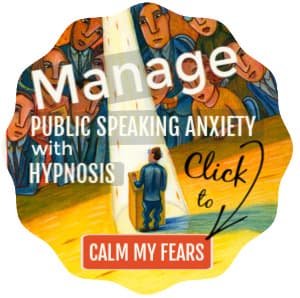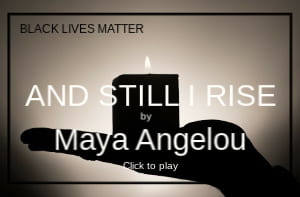- HOME ›
- Speech topics ›
- Controversial speech topics
242 controversial speech topics
How to choose a good argumentative speech topic
By: Susan Dugdale
'Girls wear trousers whenever and where ever they choose. Therefore boys should be accorded the same freedom to wear dresses if they want to.'
That's an example of a current controversial speech topic. It does exactly what you want a good controversial topic to do: trigger emotional responses both for, and against it. Schools who require their students to wear gendered uniforms (dresses for girls and trousers for boys) are being actively challenged!
Controversial or argumentative topics teach us to evaluate ideas, to think through pros and cons, and to debate. Because they are often so polarizing, they make some of the very best persuasive speech topics!
What's on this page:
- 242 controversial speech topics - 40 food topics, 31 babies and children topics, 37 topics on teenagers, 133 topics on differing aspects of society
- What are controversial speech topics? Understanding what makes a topic controversial - the mix of passion, belief, fact and fiction.
- How to choose the best argumentative topic
- Resources for more topics and developing your speech
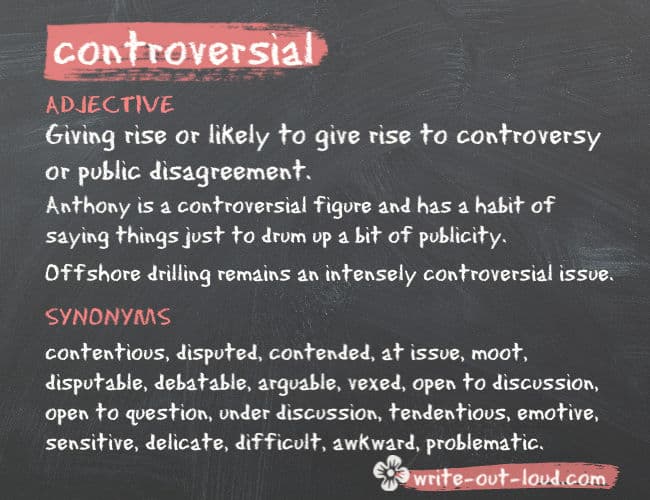
What are controversial speech topics?
The key word is controversial. It has a similar meaning to argumentative.
Controversial comes from the word controversy meaning:
- a prolonged public dispute, debate, or contention; disputation concerning a matter of opinion.
- contention, strife, or argument.
Synonyms are:
- disagreement, altercation.
- quarrel, wrangle.
Click for a full dictionary definition.
Therefore controversial speech topics or argumentative speech topics are those evoking passionate opinions: ones capable of splitting families, friends, communities and countries.
These are the hot topics, the sensitive topics, the ones we're currently working our way through.
Both sides of the debate are often convinced their point of view is right and their opposition's is wrong.
The benefit of delving into subject matter like this is being pushed to consider our own attitudes, values and emotional responses, which in turn helps makes us think more clearly.
Historical controversial speech topics
History gives us examples of topics that once caused major strife. Now with the benefit of hindsight, we may wonder what all the fuss was about. Opinions have changed. What was once dangerous to discuss or even think about has become commonplace: unremarkable and acceptable.
Believing the earth moves around the sun, doesn't even raise an eyebrow now. But in 1633, in Italy, it was a highly controversial subject. The Roman Inquisition sentenced the famous astronomer Galileo to permanent house arrest over it.
Centuries later the abolition of slavery, giving women the vote, and desegregation in schools provoked similarly strong responses.
Modern controversial topics
Like their historical forerunners, these are argumentative or persuasive speech topics reflecting the current political and social issues impacting on, and shaping people's lives.
They can be broad, affecting everybody in the world, for example the global warming controversy (Does it really exist?), or narrow, concerning far fewer people. A good example of the latter are local conservation issues.
For instance in the area where I live there is a current, very lively, debate over land usage adjacent to an estuary.
Should a developer be given permission to close down the much used public walkway on the estuary edge in order to make it easier for his commercial development to go ahead?

Regardless of their reach: global, national or local, controversial subjects draw impassioned debate.
Who is right?
Who is wrong?
And is there a middle ground or compromise acceptable to both sides?
How to choose a perfect persuasive speech topic
If you want your speech to be the best it can be, what comes next can make or break it.
Your first step is to consider ALL of the following aspects carefully before settling on a topic.
Who is your target audience?
A good speaker always considers their audience and shapes their speech around them.
Think about the people you intend to speak to:
- Are they young? Are they older? Are they predominately male, female, or a mix?
- What common themes, attitudes, values and beliefs unite them?
- What cultural or social backgrounds do they have?
- What would be a good topic, one that is appropriate for both them and the occasion? The right topic will genuinely interest them, and will benefit them to know about.
- What do they expect from you as a speaker?
What is the purpose of your speech?
- Do you want to shock?
- Do you want to inform?
- Do you want to persuade?
- Is it a mixture of all, or some, of the above?
- What do you want the audience to do as a result of having listened to your speech?
Research & presentation
An effective controversial or argumentative speech is well
researched. This provides it with a rational, rather than purely emotive, base.
For example:
"I don't like XXX.", has no logical appeal at all! It is not an argument.
However, "I don't like XXX for the following three reasons..." , is the beginning of one.
If you want to challenge or change opinion you will research:
- the background history of your topic
- both sides of the argument - the for and against
You will present:
- factual, and if possible, demonstrable evidence or proof
- examples
- unbiased statistics
- and do so in a way that the audience can follow while fulfilling your speech purpose.
And very lastly
Choose a subject that truly interests you. That way your enthusiasm will carry you through the research, writing process, and rehearsal, to delivery.
242 controversial speech topics
There are 242 persuasive speech topic ideas below for you to consider, split across four broad groups: food, babies and children, teenagers, and society.
What is more fundamental than the foods we eat?
Like air the breathe, the food we eat is essential to our survival and its history is a fascinating window into country, culture, and class.
Food is controversial. It always has been and always will be. It is that way because it is vital, and anything vital arouses deeply felt passions.
Have fun with these!

- Fad dieting is driven by fashion rather than by fact and reason.
- Children should never be fed foods containing refined sugars.
- Children should never be put on fad diets.
- A mono (single food) diet of any sort is dangerous. Eg. a banana, or an apple diet.
- Refined sugar in manufactured foods including drinks causes ill health.
- Foods that are high in refined sugars should be taxed.
- All manufactured foods should have complete disclosure ingredient labeling.
- A vegan diet is the way of the future.
- Eating endangered species of any sort should be banned.
- Killing sharks for their fins to make shark fin soup should be illegal.
- Catching whales for consumption should be banned.
- Foie gras, and any other food produced through cruelty to animals, birds or fish, should be entirely banned.
- Only foods produced sustainably and ethically should be eaten.
- The use of aspartame (sugar substitute) should be banned.
- Plastic food packaging should be banned.
- Our diets should mainly consist of seasonal foods that come from the region we live in.
- Fresh foods are healthier than processed.
- Locally grown foods are best.
- Artificial preservatives should not be used in food preparation.
- There should be no such thing as food waste.
- Healthy free food should be available to those who need it.
- Everybody should be taught to how to prepare simple, nutritious meals using raw ingredients rather than packaged or processed foods.
- Eating healthily saves lives.
- Schools should provide healthy meal options for their students at either free or at minimal cost.
- Fast, or take-out, food is addictive.
- Food should be prepared for the eyes as well as the stomach.
- Eating well doesn't need to be expensive.
- City authorities should encourage and support growing food on public land.
- We are what we eat. Fact or fiction.
- Children should be encouraged to eat whatever is given them.
- Do we eat to live, or live to eat?
- Judging people on the basis of the food they eat shows a lack of empathy.
- Good table manners are essential.
- Meals need to be eaten at regular times.
- In western, or first world, countries we need to control portion size.
- Food snobbery reinforces socio-economic difference.
- Food manufacturers have a responsibility to ensure the food they produce is wholesome regardless of its price and who it is intended for.
- Special designer diets are a luxury.
- Eating less meat and dairy foods would help save the planet.
- The family who eats together stays together.
Babies, children and teenagers
There are few topic areas more emotive than those to do with children. They are our future, our personal and family continuity, and often our reason for living.
How we shelter them, bring them up, educate and nourish them, literally and metaphorically, will always spark intense debates.
Topics about babies and children
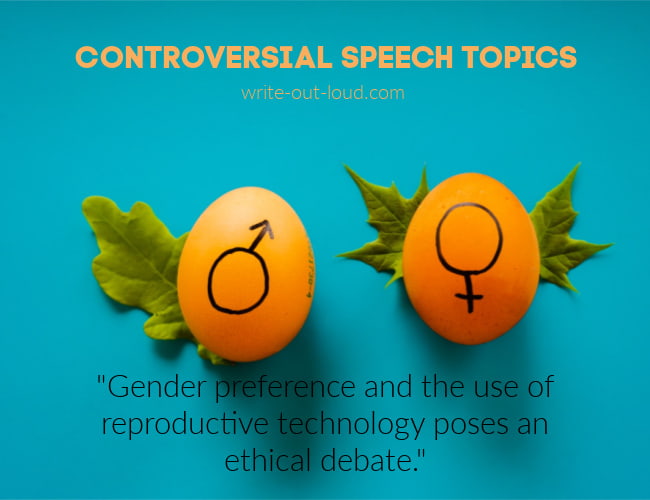
- The use of reproductive technology should be accessible to every one.
- Gender preference and the use of reproductive technology poses an ethical debate.
- Gender should never be a reason to abort a fetus.
- Genetic engineering is a moral and ethical minefield.
- Cloning babies should be banned.
- Children learn while they are in their mother's uterus.
- Every mother and her new-born child should receive the very best care available regardless of expense - paid for by state subsidy if needed.
- Children and babies should never be taken from their birth mothers on account of race.
- Being born outside of marriage is not a crime.
- All children should have the right to know who their parents are.
- Every child, regardless of the circumstances of their conception and birth, has the right to live, and to be loved.
- Every child has the right to a childhood.
- No child should be expected or forced to go to work.
- Every child has a right to an education.
- No child should be denied health care on the basis of cost.
- Every child deserves the best and most nutritious food possible.
- All children should have the opportunity to develop their abilities.
- No child should be the subject of any form of exploitation.
- Indoctrination (political or religious) of children is morally wrong.
- Children's education and extra-curricular activities should be free of gender bias.
- Children should be encouraged to be the best of themselves they can be, rather than the best boy or girl they can be.
- Marketing for children should be gender-free.
- Pink-washing everything (clothing, toys, sports gear ...) for girls is nothing but cynical marketing.
- 'Boys will be boys' as an explanation for tolerating poor behavior from male children is damaging.
- Advertising targeting children needs to be in the child's best interest.
- The rise of children's use of technology has impacts on their ability to learn effective, meaningful face-face communication skills.
- Children without their own screen (computer, tablet etc) are compromised educationally.
- Every child should have unscheduled, uninterrupted time to play.
- The culture of excessive public health and safety concern is inhibiting children's natural curiosity to experiment and learn about their own physical capabilities.
- Parental and societal pressure to achieve academically is not always in the child's best interest.
- A woman should have the right to make decisions about her own body and to have them respected. That includes: using, or not using, the best of whatever method of birth control is available to her, pre-birth screening for disabilities, and abortion on demand.
Topics for, and about, teenagers
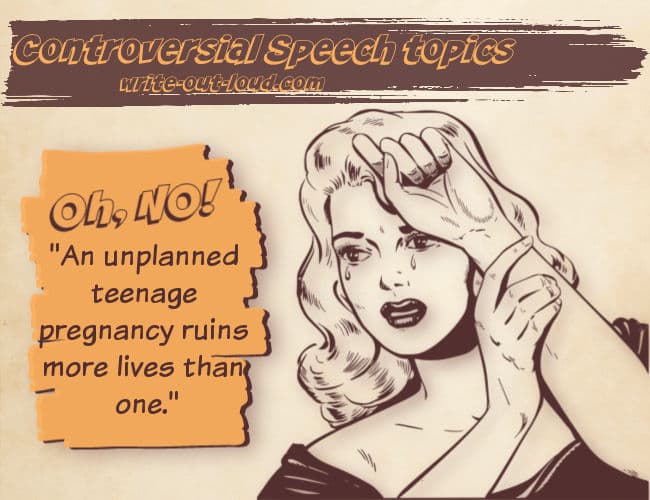
- Making errors of judgment as a teenager is part of learning to become a responsible adult.
- Cell phones are an absolute necessity for teenagers.
- Cell phone usage restrictions are understandable.
- As a teen friends have more influence than family.
- Negotiating parental expectations is part of being a teenager.
- A teenager should not be allowed to get tattooed.
- Gender identity is becoming less important.
- All teenagers should do regular public service work.
- Teenagers should work to contribute toward their own living costs.
- Alcohol and drug education for teenagers is seldom effective.
- Bullying of any sort is unjustifiable.
- Taking and posting selfies on social media is a form of narcissism.
- Real friends are not the people who like your posts on social media.
- Keeping safe on the internet is important.
- Every teenager deserves at least three or four chances.
- Single sex schools are best.
- Educational opportunities should be available to all.
- A juvenile should never be treated like an adult in the justice system.
- Teenagers have a right to privacy.
- Most juvenile crime is the result of living in difficult family situations and communities.
- Teenage boys would not act out so much if they had positive male role models.
- An unplanned teenage pregnancy ruins more lives than one.
- The advertising industry exploits teenage insecurities.
- Ranking students on their academic scores is not an accurate measure of their potential.
- Being a teenage boy/girl is becoming increasingly challenging.
- Girls wear trousers. Therefore boys can wear dresses if they choose to.
- Stereotyping anybody is limiting the possibility you may have to see them as a real person.
- The music industry needs to take more responsibility for the way they influence moods and behavior.
- Censorship is sometimes necessary to protect us from things and people who could cause us harm.
- Violence should never be glorified or admired.
- Learning to cope with embarrassment without plunging into despair is an important life lesson.
- Leaning to accept and positively work with our own shortcomings is a sign of maturity.
- Envying others for their looks, money, intelligence and abilities or anything else is a waste of time.
- Parents should never lie.
- Respecting adults can be very difficult.
- What a person looks like, how they dress, determines how people respond to them.
- Having a positive role model is essential.
Controversial topics covering aspects of our society
Medicine, drugs, education, conservation, voting, climate change, fossil fuels, water shortages, colonization, taxes, art, religion, housing...
There are so many topic possibilities to be controversially passionate about! Any one of them could make a good speech.
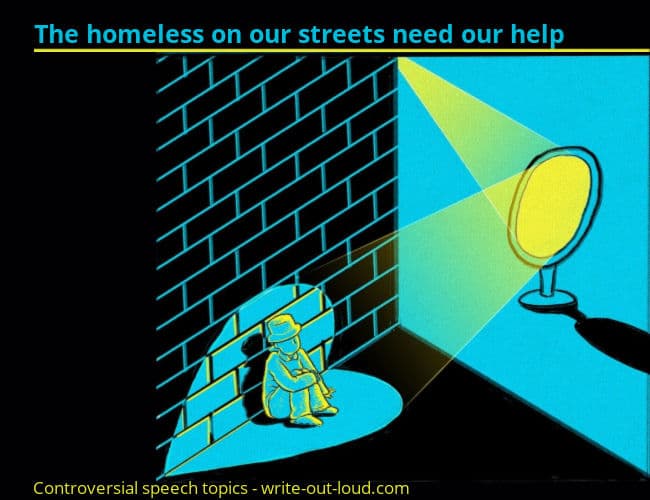
- Aside from what is required by nature for reproduction of the human species, there are no true gender specific roles.
- Equal pay for equal work should be enshrined in law.
- Everybody who works for a living deserves a livable wage.
- Social services should be fully funded and supported by government.
- Nobody deserves to have a better standard of healthcare than anybody else.
- The homeless on our streets need our help.
- Victims of family violence should never be shamed.
- Perpetrators of family violence need help rather than blame.
- Poverty causes people to commit crimes, not character.
- All recreational drugs should be legalized.
- Addictive illegal drugs are not the root cause of the problems that people who use them have. They are only an indication of something else needing closer attention.
- Alcohol should be taxed more heavily to help reduce alcohol related problems.
- Pharmaceutical companies should be held accountable for the dependency difficulties people get into with some prescribed drugs.
- Animal testing of pharmaceutical drugs is unethical.
- Cars should be banned from city centers.
- Owners of vehicles that run on petrol or diesel should pay an emission tax.
- Increased use of public transport should be supported and encouraged by the state.
- Individual ownership of vehicles for transport in cities should be discouraged.
- A license to drive a vehicle should be much harder to get.
- Driverless cars are the way of the future.
- Everyone in cities benefits from more green spaces.
- Easily accessible green spaces should be part of any housing development.
- Accessibility to green spaces improves people's mental health.
- All urban development should be 'green': fully sustainable.
- Affordable, secure, healthy housing should be available to all.
- The countries, the cities, and the houses we live in shape our lives.
- Acceptance of equality and diversity is the only way forward for society.
- Diversity is more than mere tokenism.
- All people are equal, but some are more equal than others is a truth we need to accept.
- Opportunities are open for everybody. People just need to take them.
- Poverty is a state of mind that is outwardly expressed through low educational achievements and poor job choices.
- Being poor is not a crime, a character flaw, or a judgment from God.
- Monetary wealth always polarizes people.
- Wealth should never be used as a measure of a person's worth.
- Becoming more and more wealthy through exploitative means should not be allowed.
- Paying taxes is necessary for society to function.
- Tax avoidance is unethical.
- Taxes should be used to benefit those who need it most.
- Tax breaks should only be given to companies or people who genuinely need them.
- Those who are more wealthy should pay more tax.
- How land is used should be decided in conjunction with those who will be impacted, not just the land owner.
- Land is a finite resource and should be treated accordingly.
- Land use practices that are known, and proven, to cause long term harm to the environment should be banned.
- We all live in the world, therefore we all should have a say about how its resources are used.
- Deep-sea mining should be banned.
- Fracking does more harm than good.
- Global warming and deforestation go hand in hand.
- Intensive and extensive mono-cropping is ultimately unsustainable.
- Eco-terrorism is justifiable.
- 'Green' industrial, agriculture and fishing practices are the only way to slow the damage we are doing to our planet.
- Eco-fascism is a misguided attempt to preserve a white, privileged existence. (See this UK Guardian article for more: Eco-fascists and the ugly fight for 'our way of life' as the environment disintegrates)
- All animals deserve to be treated with respect.
- Colonizing space is a possible answer to our growing environmental challenges.
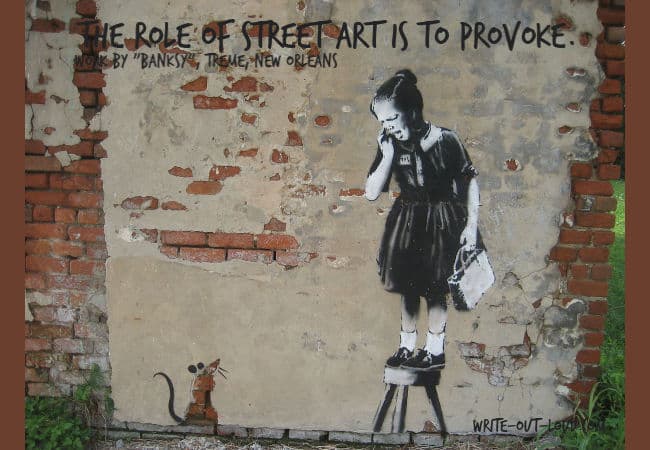
- Artists are as essential to society's health and well-being as any other service we depend on: for instance law and order, medical ...
- Public art humanizes our cities. It shows us who we are.
- Works of art that were stolen from their owners in times of war should be returned.
- Artifacts that have been removed from their places and countries of origin should be returned.
- The role of street art is to provoke.
- Admissions to city museums and art galleries should be free.
- Cultural appropriation in art, music, or any other sphere, is theft.
- Good art is always controversial.
- The elderly have the right to expect to be fully cared for.
- Ageism is a mark of an intolerant, arrogant society.
- We need to make it easier for families to support their elderly members in their own homes.
- Everyone who needs it should have access to good child care for their children.
- Segregation through race, gender, intellectual capacity, physical abilities, health, religion, wealth ... supports and underlines a tiered society.
- Political correctness has gone mad.
- Some day we will look back and wonder why it took so long, and why we had to go through so much strife to establish that same sex couples should have the same rights as heterosexual couples.
- Any form of extremism is dangerous.
- Racial profiling should be illegal.
- Using quota systems to manage people is demeaning.
- School violence would be much less if guns were not so freely available.
- School violence is a symptom of a very sick society.
- Hate crimes are often committed for revenge.
- 'An eye for an eye, a tooth for a tooth' is never justifiable.
- There should be far greater gun control.
- Controlling who owns guns will not stop crime.
- The gentrification of our cities is to blame for the increased cost of housing and growing homelessness.
- State censorship is justified.
- Sensible censorship is about protecting vulnerable people from material which could cause them harm.
- Censorship on the internet is impossible.
- Beauty in a person is a state of mind or being, not necessarily something physical.
- Our concepts of beauty are determined by popular culture.
- An aging body can be beautiful.
- Fashion is to blame for the rise of eating disorders among young people.
- Being a slave to fashion is foolish.
- Fashion is creative, artistic and fun.
- Fashion celebrates the joy of looking and feeling good.
- A woman dresses well to make other women envious.
- Fashion that inhibits movement is ridiculous.
- Wearing a piece of conspicuously brand-labelled clothing is a signal that the wearer wants to be identified as sharing the brand's values and image.
- Clothing choices speak louder than words.
- Capital punishment, or the death penalty, is barbaric and should be banned.
- Voting rights should be automatically granted to anyone of voting age who is of sound mind and a citizen.
- Voting should be compulsory for everyone who is entitled to vote.
- People should be allowed to follow whatever religious belief they choose.
- Karl Marx said, religion is the opiate of the masses. How is that true?
- Being a good person and being a religious person can be two very different things.
- Can a religion and a cult be one and the same?
- Religious practices that physically or psychologically harm a person should be banned.
- Once they are old enough, children from religious families should have the freedom to make their own decision about whether or not they want to follow in their family's footsteps.
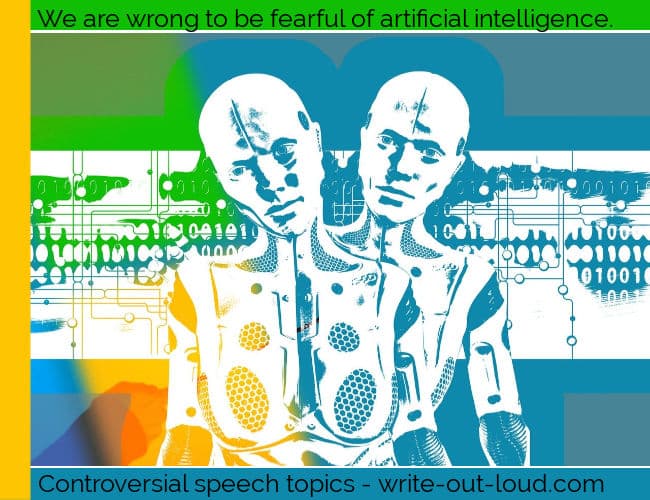
- Stalking, either physically or online, is harassment and those who do it should be prosecuted.
- Where and when does the right to privacy stop?
- How can we protect our privacy, and use social media?
- Unauthorized collection and use of personal data is illegal. Offenders, regardless of who they are, should be prosecuted and those who profit from the use of illegally collected data should forfeit their gains. (As an example see this Wikipedia overview of the 2018 Facebook–Cambridge Analytica data scandal where millions of Facebook users had their personal data used for political advertising.)
- Government control of the media is sometimes necessary.
- Society is controlled by whoever controls our media.
- There is no such thing as unbiased news coverage.
- If media companies have a particular political and/or commercial interest it should be transparent.
- Anybody or organization who either generates or passes on fake news should be prosecuted.
- Fake news and conspiracy theories feed on fear.
- Some conspiracy theories are true.
- Some news seems so shocking it can't be true.
- We are wrong to be fearful about artificial intelligence.
- Joseph Goebbels, minister of propaganda for the German Third Reich under Adolf Hitler, famously said: “If you repeat a lie often enough, it becomes the truth.” Is this true?
- We are less able to judge if what we read online is fake news or not because the way we get our news has changed in the digital age. Through the use of algorithms information is filtered and we are shown articles reflecting the existing opinions of our own and our friends. How true is this?
- Only foolish people fall for online scams and get-rich quick schemes.
- Provocative headlines can be an effective way to provoke interest.
- When do advertising campaigns step over the line and become offensive?
- Advertising companies feed on people's weaknesses.
- Nationalism creates 'them and us' scenarios.
- We need to think and cooperate on a global scale.
- Separatism is seldom successful.
- Confusing tolerating hate speech with freedom of speech or the right to speak is wrong.
- Freedom of speech comes with responsibility.
- Empathy as well as action are needed to change the injustices of the world.
- Religion has no place in the government of a country.
- A country gets the government and leadership it deserves.
- Sometimes personal ethics and morals need to be put aside for the good of the community.
- Putting people in jail is neither humane nor sustainable.
- Electronic surveillance is violation of human rights.
- Torture is never justified.
- War is a barbaric answer to a problem between countries.
If you need more topic ideas ...
Try Questia - You'll find an enormous list of controversial topics in alphabetical order, starting with Abortion and ending with Year-round school. Each topic area has an overview and an associated book or article list. It's an extremely thorough compilation and an excellent resource.
Get help with writing, rehearsing and more
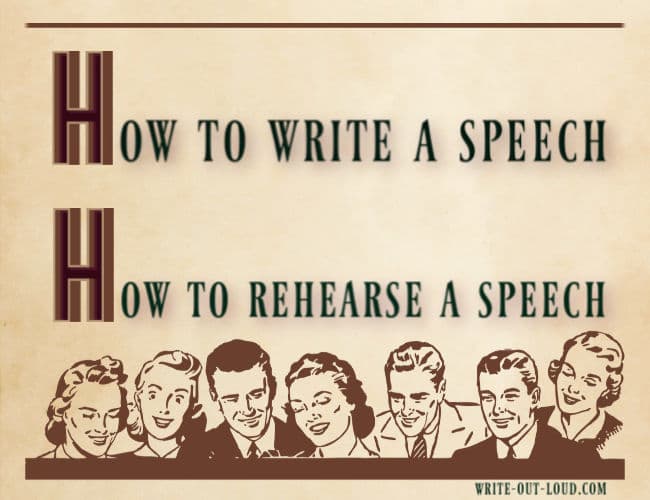
Should you need it there is comprehensive on-site help for every aspect of preparing, rehearsing and help to tame any anxiety you may be feeling about making a presentation. (There's enough here to make you very happy with the end result! ☺)

